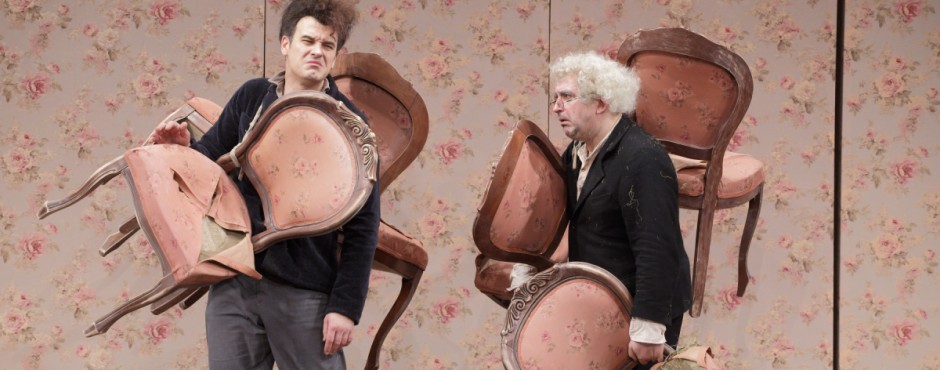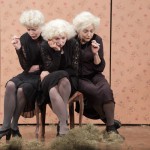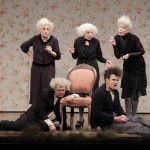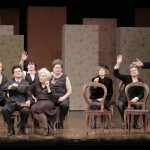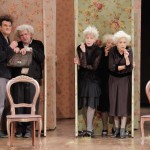Saturday, May 23, 17:00
The New Riga Theatre, Lāčplēša iela 25
Duration: 4h
In Latvian with English translation
Based on the book ’12 Chairs’ by Ilya Ilf and Evgeny Petrov
Director Alvis Hermanis
Set design: Alvis Hermanis
Costumes: Kristīne Jurjāne
Performers: Andris Keišs, Gundars Āboliņš, Ģirts Krūmiņš, Baiba Broka, Guna Zariņa, Sandra Kļaviņa vai Elita Kļaviņa, Jana Čivžele, Vilis Daudziņš, Ivars Krasts, Jevgēņijs Isajevs, Varis Piņķis, Regīna Razuma, Edgars Samītis, Andis Strods
Producer: The New Riga Theatre (www.jrt.lv)
Premiere on December 7, 2014
In his most recent theatre production, the internationally acclaimed Latvian director Alvis Hermanis, adapts “The Twelve Chairs”, the iconic Soviet satirical novel from the 1920s. In this story about an unlikely couple of companions on a treasure hunt in post-revolution Russia, Hermanis has returned to grotesque (as in his brilliant “The Government Inspector” from 2002) and chosen to make this famously sharp and witty critic of Sovietism into a tale of Jewish jokes.
„The main protagonists of this story, Ostap Bender and Kisa, have long ago become part of the folklore, and their visualisation on stage is a hopeless and outrageous bravery from our side. We apologize for that in advance,” says the introduction in the theatre webpage. Yet, it has been agreed by critics and audiences alike that actor Andris Keišs delivers an utmost performance in the role of adventurous, buoyant con man Ostap Bender.
Alvis Hermanis (1965) is recognized as one of the most significant directors of his generation in European theatre. His productions differ from each other quite markedly in terms of style and content, however, they are consistent in being orientated around the work of the actor and showing a scrupulous precision in the choice of their form and theatrical vocabulary.
Since 1997 Hermanis has been the artistic director of the New Riga Theatre where he has staged numerous productions, building a devoted audience and receiving critical acclaim. His international break-through came in 2003 when Hermanis presented “The Government Inspector” with the New Riga Theatre ensemble at the Salzburg Festpiele and was awarded the Young Directors Project prize. Hermanis’ fame soon spread through all of Europe; his creations being shown at the main international festivals. This success also paved his way for a long lasting career in German speaking theatre, starting with “Ice. A collective book reading with the help of your imagination” which was co-produced by Rurh Triennale in 2005, follwed by productions in Köln, Berlin, Zürich and Vienna.
While directing productions abroad, Hermanis maintained his commitment to the New Riga Theatre. Between 2003-2011 Hermanis together with his ‘gang’, the actors on the New Riga Theatre, engaged into ‘Latvian series’. Performances “Long Life” (2003), “Latvian Stories” (2004), “Latvian Love” (2006), “Grandfather” (2009), “Martha from the Blue Hill” (2009), “Ziedonis and the Universe”(2010), “Black Milk”(2010) and “Graveyard Party” (2011) were created as etudes based on the real-life stories of actual Latvian people encountered during an extensive research by the actors and the application of actors’ personal experiences. After 2011 Hermanis abandoned the contemporary documentalism and turned to a scrupulous reconstruction of the past. “Where generations of theatre makers once devoted their entire ambitions to ripping down the fourth wall, Alvis Hermanis puts it up again – with a radical intent which may never existed before”, wrote German critics. His productions of the great Russian classics staged in Riga and abroad – “Oblomov” in Köln and Riga, “Platonov” in Vienna, “Onegin. Commentaries” in Berlin and Riga, “Wassa” in Munich, simultaneously kept the audience at a distance while immersing them in a faraway world and time where, as if locked behind glass the actors, the detailed decor, perfect lightning and richness of the tiniest details created the long vanished world of the Russian aristocracy of the past centuries.
For the last three years Hermanis has been intensively staging productions in European opera houses, starting with Zimmermann’s “Die Soldaten” at Salzburg Festival. In between his engagements in La Monnaie, Komischen Oper and Staatsoper in Berlin, Paris Opera, Hermanis occasionally returns to dramatic theatre. His most recent theatre production is “Die schönsten Sterbeszenen in der Geschichte der Oper“ at Schauspielhaus Zürich. In autumn 2015 Hermanis will premiere a new production in Riga with Mihail Baryshnikov reading poetry by Joseph Brodsky.
Back

